Family Law: Parental Responsibility, Children Act 1989, and Public Law
VerifiedAdded on 2023/06/10
|10
|2538
|57
Report
AI Summary
This report provides a detailed analysis of the Children Act 1989 and its implications within the framework of family law in the United Kingdom. It begins with an introduction to the Act, emphasizing its role in safeguarding children and ensuring their welfare. The main body delves into the specifics of the Children Act 1989, outlining parental responsibilities as defined under Section 3(1), including duties related to a child's upbringing, education, and well-being. The report also explores the various orders outlined in Section 8, such as Child Arrangement Orders, Prohibited Steps Orders, and Specific Issue Orders, and how they address disputes regarding child custody and care. Furthermore, the report examines public law orders, including care orders, supervision orders, and emergency protection orders, highlighting the role of local authorities and the courts in protecting children from harm. The report concludes by summarizing the key findings and emphasizing the government's commitment to child protection through the implementation of relevant legislation. The report is available on Desklib, a platform offering AI-based study tools for students.
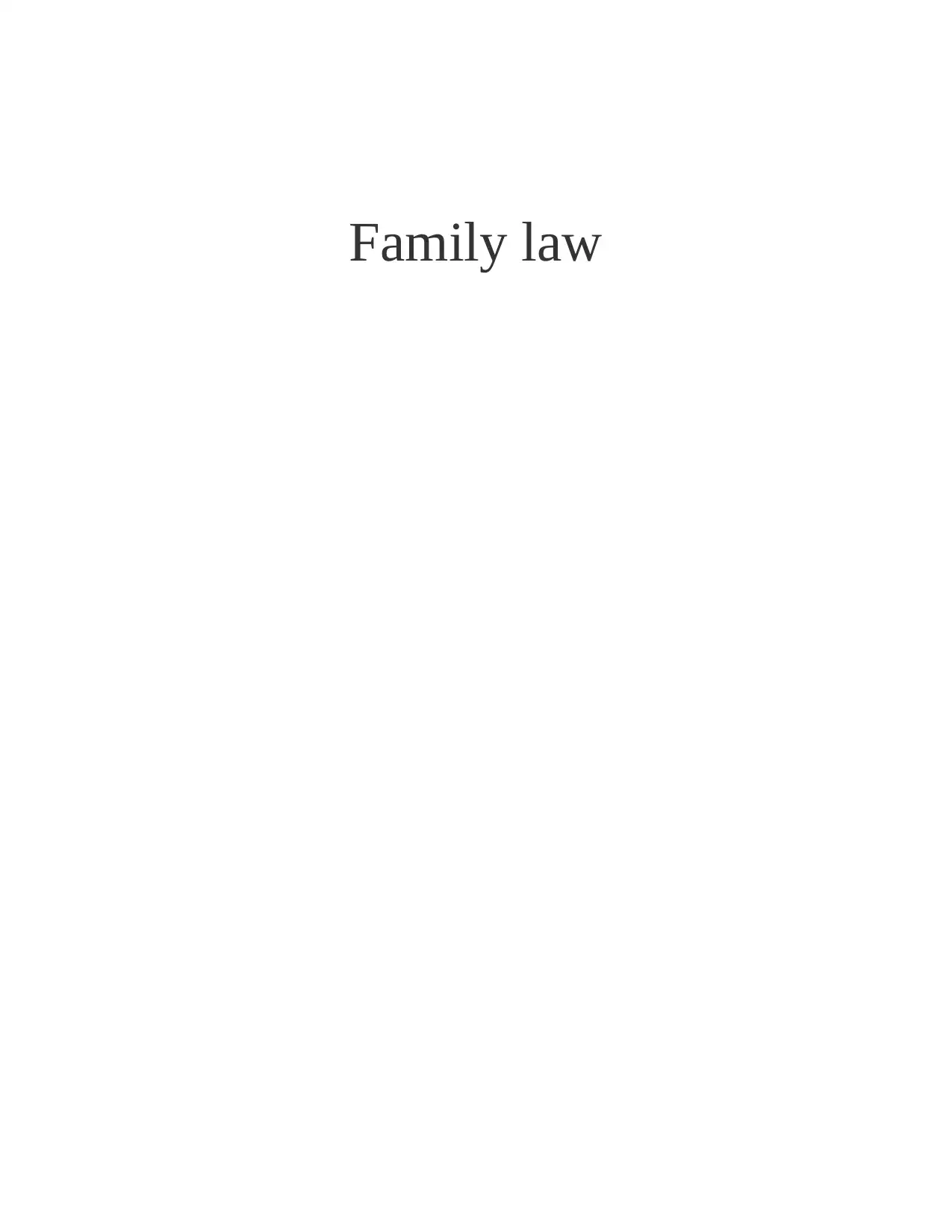
Family law
Paraphrase This Document
Need a fresh take? Get an instant paraphrase of this document with our AI Paraphraser
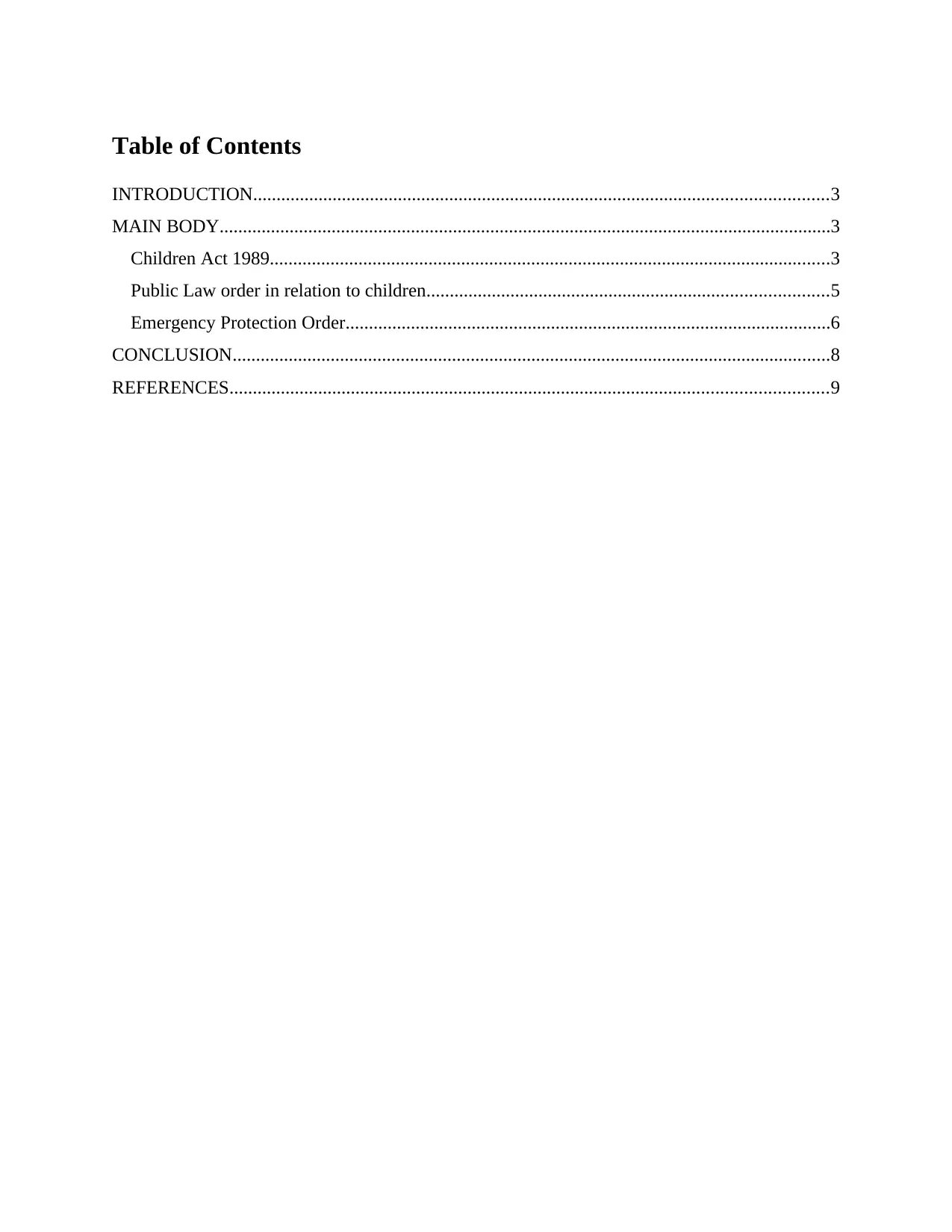
Table of Contents
INTRODUCTION...........................................................................................................................3
MAIN BODY...................................................................................................................................3
Children Act 1989........................................................................................................................3
Public Law order in relation to children......................................................................................5
Emergency Protection Order........................................................................................................6
CONCLUSION................................................................................................................................8
REFERENCES................................................................................................................................9
INTRODUCTION...........................................................................................................................3
MAIN BODY...................................................................................................................................3
Children Act 1989........................................................................................................................3
Public Law order in relation to children......................................................................................5
Emergency Protection Order........................................................................................................6
CONCLUSION................................................................................................................................8
REFERENCES................................................................................................................................9
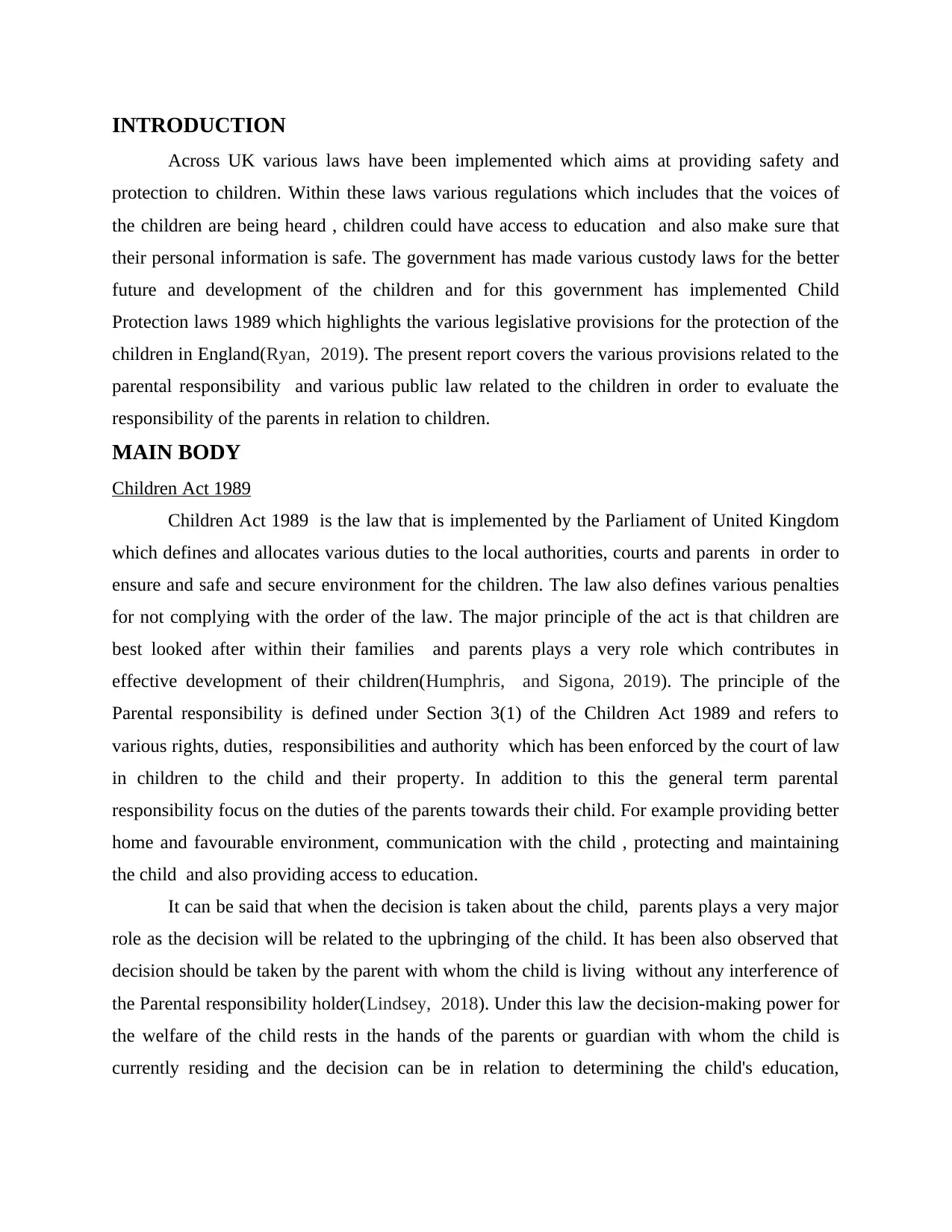
INTRODUCTION
Across UK various laws have been implemented which aims at providing safety and
protection to children. Within these laws various regulations which includes that the voices of
the children are being heard , children could have access to education and also make sure that
their personal information is safe. The government has made various custody laws for the better
future and development of the children and for this government has implemented Child
Protection laws 1989 which highlights the various legislative provisions for the protection of the
children in England(Ryan, 2019). The present report covers the various provisions related to the
parental responsibility and various public law related to the children in order to evaluate the
responsibility of the parents in relation to children.
MAIN BODY
Children Act 1989
Children Act 1989 is the law that is implemented by the Parliament of United Kingdom
which defines and allocates various duties to the local authorities, courts and parents in order to
ensure and safe and secure environment for the children. The law also defines various penalties
for not complying with the order of the law. The major principle of the act is that children are
best looked after within their families and parents plays a very role which contributes in
effective development of their children(Humphris, and Sigona, 2019). The principle of the
Parental responsibility is defined under Section 3(1) of the Children Act 1989 and refers to
various rights, duties, responsibilities and authority which has been enforced by the court of law
in children to the child and their property. In addition to this the general term parental
responsibility focus on the duties of the parents towards their child. For example providing better
home and favourable environment, communication with the child , protecting and maintaining
the child and also providing access to education.
It can be said that when the decision is taken about the child, parents plays a very major
role as the decision will be related to the upbringing of the child. It has been also observed that
decision should be taken by the parent with whom the child is living without any interference of
the Parental responsibility holder(Lindsey, 2018). Under this law the decision-making power for
the welfare of the child rests in the hands of the parents or guardian with whom the child is
currently residing and the decision can be in relation to determining the child's education,
Across UK various laws have been implemented which aims at providing safety and
protection to children. Within these laws various regulations which includes that the voices of
the children are being heard , children could have access to education and also make sure that
their personal information is safe. The government has made various custody laws for the better
future and development of the children and for this government has implemented Child
Protection laws 1989 which highlights the various legislative provisions for the protection of the
children in England(Ryan, 2019). The present report covers the various provisions related to the
parental responsibility and various public law related to the children in order to evaluate the
responsibility of the parents in relation to children.
MAIN BODY
Children Act 1989
Children Act 1989 is the law that is implemented by the Parliament of United Kingdom
which defines and allocates various duties to the local authorities, courts and parents in order to
ensure and safe and secure environment for the children. The law also defines various penalties
for not complying with the order of the law. The major principle of the act is that children are
best looked after within their families and parents plays a very role which contributes in
effective development of their children(Humphris, and Sigona, 2019). The principle of the
Parental responsibility is defined under Section 3(1) of the Children Act 1989 and refers to
various rights, duties, responsibilities and authority which has been enforced by the court of law
in children to the child and their property. In addition to this the general term parental
responsibility focus on the duties of the parents towards their child. For example providing better
home and favourable environment, communication with the child , protecting and maintaining
the child and also providing access to education.
It can be said that when the decision is taken about the child, parents plays a very major
role as the decision will be related to the upbringing of the child. It has been also observed that
decision should be taken by the parent with whom the child is living without any interference of
the Parental responsibility holder(Lindsey, 2018). Under this law the decision-making power for
the welfare of the child rests in the hands of the parents or guardian with whom the child is
currently residing and the decision can be in relation to determining the child's education,
⊘ This is a preview!⊘
Do you want full access?
Subscribe today to unlock all pages.

Trusted by 1+ million students worldwide
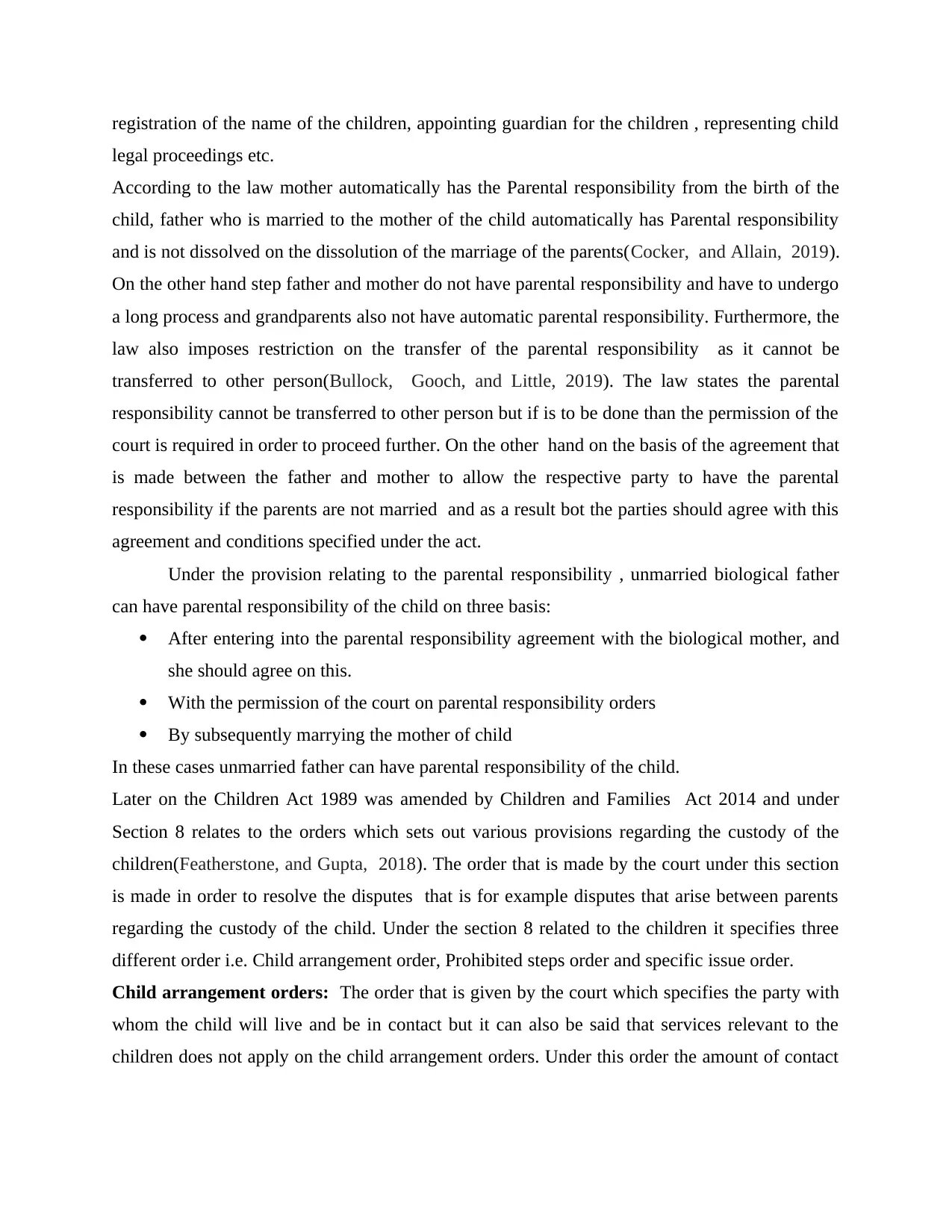
registration of the name of the children, appointing guardian for the children , representing child
legal proceedings etc.
According to the law mother automatically has the Parental responsibility from the birth of the
child, father who is married to the mother of the child automatically has Parental responsibility
and is not dissolved on the dissolution of the marriage of the parents(Cocker, and Allain, 2019).
On the other hand step father and mother do not have parental responsibility and have to undergo
a long process and grandparents also not have automatic parental responsibility. Furthermore, the
law also imposes restriction on the transfer of the parental responsibility as it cannot be
transferred to other person(Bullock, Gooch, and Little, 2019). The law states the parental
responsibility cannot be transferred to other person but if is to be done than the permission of the
court is required in order to proceed further. On the other hand on the basis of the agreement that
is made between the father and mother to allow the respective party to have the parental
responsibility if the parents are not married and as a result bot the parties should agree with this
agreement and conditions specified under the act.
Under the provision relating to the parental responsibility , unmarried biological father
can have parental responsibility of the child on three basis:
After entering into the parental responsibility agreement with the biological mother, and
she should agree on this.
With the permission of the court on parental responsibility orders
By subsequently marrying the mother of child
In these cases unmarried father can have parental responsibility of the child.
Later on the Children Act 1989 was amended by Children and Families Act 2014 and under
Section 8 relates to the orders which sets out various provisions regarding the custody of the
children(Featherstone, and Gupta, 2018). The order that is made by the court under this section
is made in order to resolve the disputes that is for example disputes that arise between parents
regarding the custody of the child. Under the section 8 related to the children it specifies three
different order i.e. Child arrangement order, Prohibited steps order and specific issue order.
Child arrangement orders: The order that is given by the court which specifies the party with
whom the child will live and be in contact but it can also be said that services relevant to the
children does not apply on the child arrangement orders. Under this order the amount of contact
legal proceedings etc.
According to the law mother automatically has the Parental responsibility from the birth of the
child, father who is married to the mother of the child automatically has Parental responsibility
and is not dissolved on the dissolution of the marriage of the parents(Cocker, and Allain, 2019).
On the other hand step father and mother do not have parental responsibility and have to undergo
a long process and grandparents also not have automatic parental responsibility. Furthermore, the
law also imposes restriction on the transfer of the parental responsibility as it cannot be
transferred to other person(Bullock, Gooch, and Little, 2019). The law states the parental
responsibility cannot be transferred to other person but if is to be done than the permission of the
court is required in order to proceed further. On the other hand on the basis of the agreement that
is made between the father and mother to allow the respective party to have the parental
responsibility if the parents are not married and as a result bot the parties should agree with this
agreement and conditions specified under the act.
Under the provision relating to the parental responsibility , unmarried biological father
can have parental responsibility of the child on three basis:
After entering into the parental responsibility agreement with the biological mother, and
she should agree on this.
With the permission of the court on parental responsibility orders
By subsequently marrying the mother of child
In these cases unmarried father can have parental responsibility of the child.
Later on the Children Act 1989 was amended by Children and Families Act 2014 and under
Section 8 relates to the orders which sets out various provisions regarding the custody of the
children(Featherstone, and Gupta, 2018). The order that is made by the court under this section
is made in order to resolve the disputes that is for example disputes that arise between parents
regarding the custody of the child. Under the section 8 related to the children it specifies three
different order i.e. Child arrangement order, Prohibited steps order and specific issue order.
Child arrangement orders: The order that is given by the court which specifies the party with
whom the child will live and be in contact but it can also be said that services relevant to the
children does not apply on the child arrangement orders. Under this order the amount of contact
Paraphrase This Document
Need a fresh take? Get an instant paraphrase of this document with our AI Paraphraser
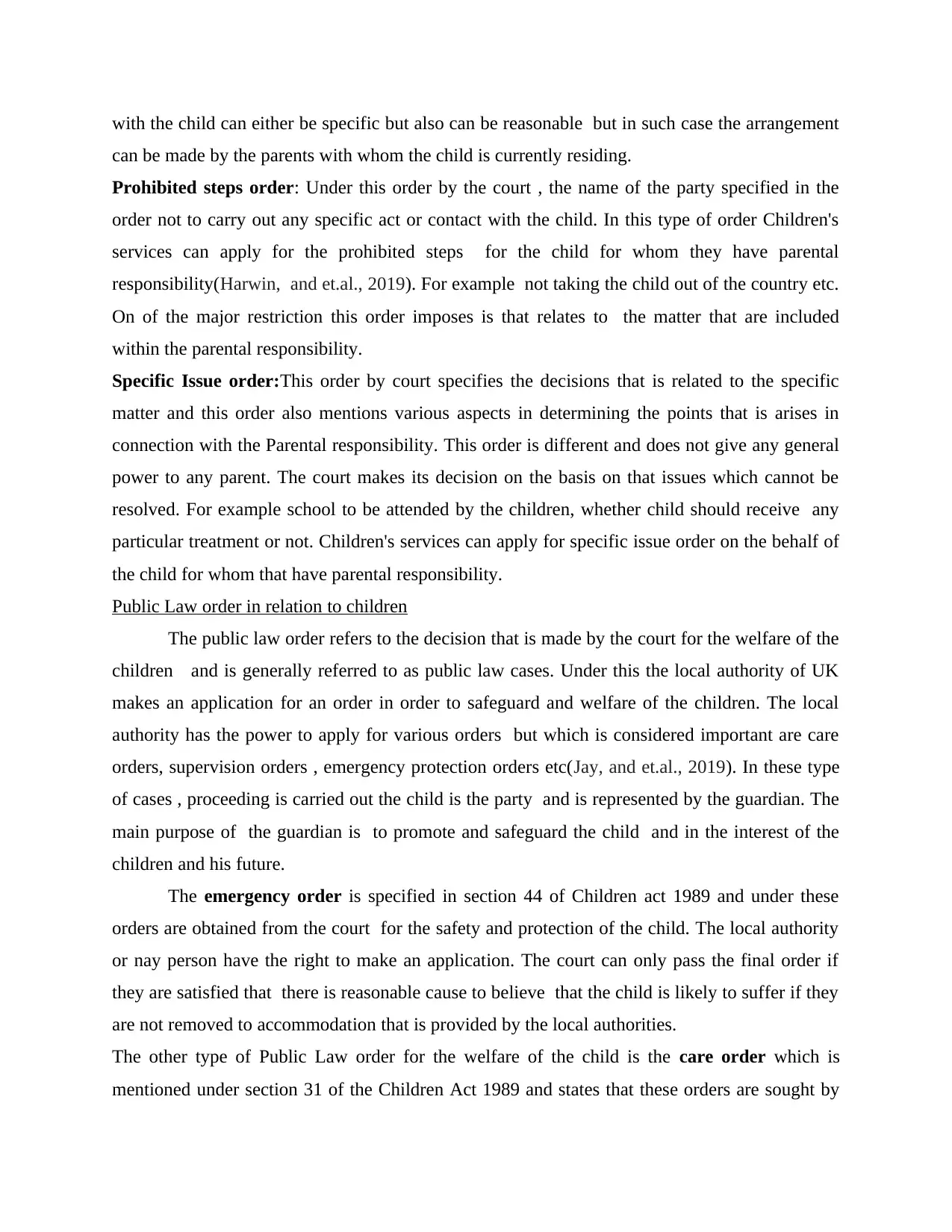
with the child can either be specific but also can be reasonable but in such case the arrangement
can be made by the parents with whom the child is currently residing.
Prohibited steps order: Under this order by the court , the name of the party specified in the
order not to carry out any specific act or contact with the child. In this type of order Children's
services can apply for the prohibited steps for the child for whom they have parental
responsibility(Harwin, and et.al., 2019). For example not taking the child out of the country etc.
On of the major restriction this order imposes is that relates to the matter that are included
within the parental responsibility.
Specific Issue order:This order by court specifies the decisions that is related to the specific
matter and this order also mentions various aspects in determining the points that is arises in
connection with the Parental responsibility. This order is different and does not give any general
power to any parent. The court makes its decision on the basis on that issues which cannot be
resolved. For example school to be attended by the children, whether child should receive any
particular treatment or not. Children's services can apply for specific issue order on the behalf of
the child for whom that have parental responsibility.
Public Law order in relation to children
The public law order refers to the decision that is made by the court for the welfare of the
children and is generally referred to as public law cases. Under this the local authority of UK
makes an application for an order in order to safeguard and welfare of the children. The local
authority has the power to apply for various orders but which is considered important are care
orders, supervision orders , emergency protection orders etc(Jay, and et.al., 2019). In these type
of cases , proceeding is carried out the child is the party and is represented by the guardian. The
main purpose of the guardian is to promote and safeguard the child and in the interest of the
children and his future.
The emergency order is specified in section 44 of Children act 1989 and under these
orders are obtained from the court for the safety and protection of the child. The local authority
or nay person have the right to make an application. The court can only pass the final order if
they are satisfied that there is reasonable cause to believe that the child is likely to suffer if they
are not removed to accommodation that is provided by the local authorities.
The other type of Public Law order for the welfare of the child is the care order which is
mentioned under section 31 of the Children Act 1989 and states that these orders are sought by
can be made by the parents with whom the child is currently residing.
Prohibited steps order: Under this order by the court , the name of the party specified in the
order not to carry out any specific act or contact with the child. In this type of order Children's
services can apply for the prohibited steps for the child for whom they have parental
responsibility(Harwin, and et.al., 2019). For example not taking the child out of the country etc.
On of the major restriction this order imposes is that relates to the matter that are included
within the parental responsibility.
Specific Issue order:This order by court specifies the decisions that is related to the specific
matter and this order also mentions various aspects in determining the points that is arises in
connection with the Parental responsibility. This order is different and does not give any general
power to any parent. The court makes its decision on the basis on that issues which cannot be
resolved. For example school to be attended by the children, whether child should receive any
particular treatment or not. Children's services can apply for specific issue order on the behalf of
the child for whom that have parental responsibility.
Public Law order in relation to children
The public law order refers to the decision that is made by the court for the welfare of the
children and is generally referred to as public law cases. Under this the local authority of UK
makes an application for an order in order to safeguard and welfare of the children. The local
authority has the power to apply for various orders but which is considered important are care
orders, supervision orders , emergency protection orders etc(Jay, and et.al., 2019). In these type
of cases , proceeding is carried out the child is the party and is represented by the guardian. The
main purpose of the guardian is to promote and safeguard the child and in the interest of the
children and his future.
The emergency order is specified in section 44 of Children act 1989 and under these
orders are obtained from the court for the safety and protection of the child. The local authority
or nay person have the right to make an application. The court can only pass the final order if
they are satisfied that there is reasonable cause to believe that the child is likely to suffer if they
are not removed to accommodation that is provided by the local authorities.
The other type of Public Law order for the welfare of the child is the care order which is
mentioned under section 31 of the Children Act 1989 and states that these orders are sought by
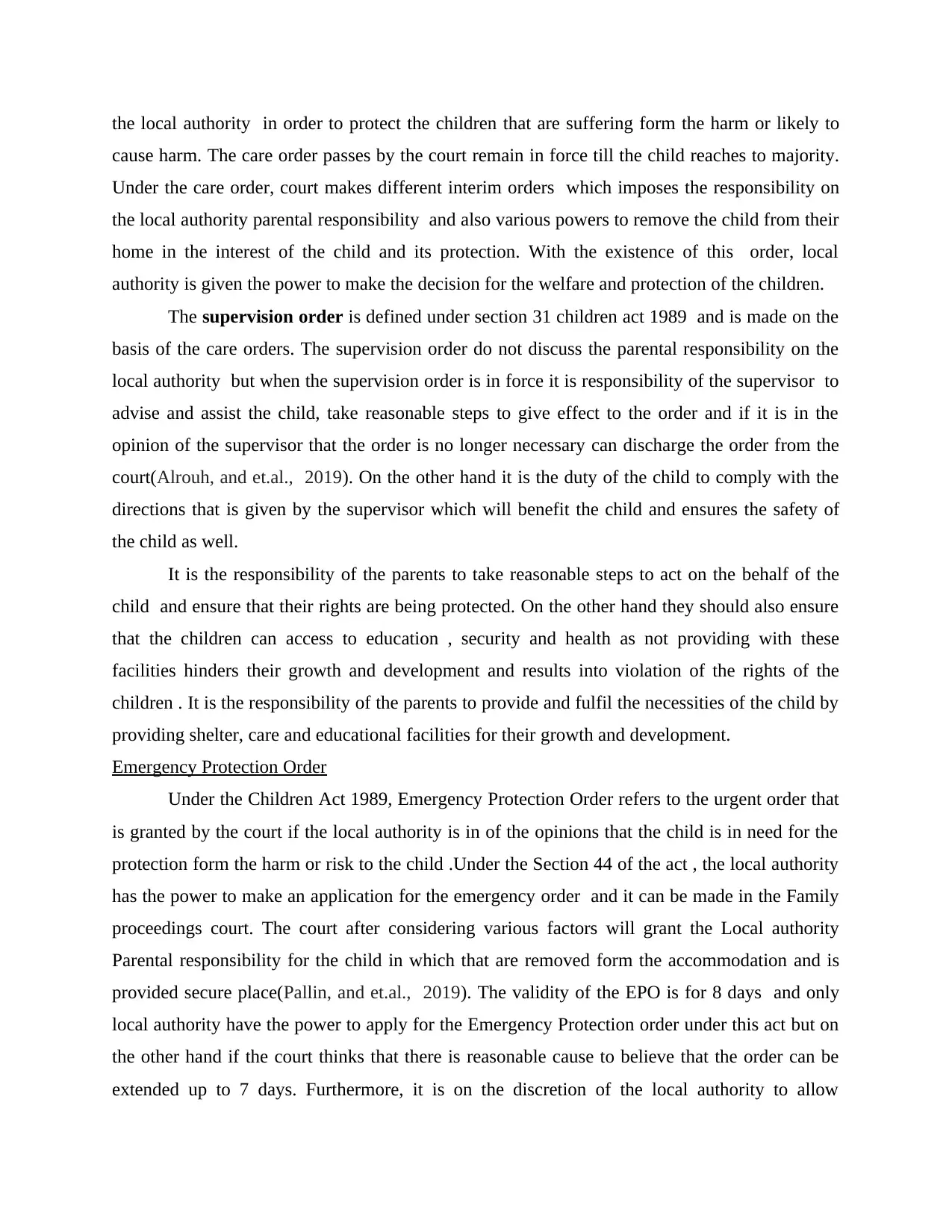
the local authority in order to protect the children that are suffering form the harm or likely to
cause harm. The care order passes by the court remain in force till the child reaches to majority.
Under the care order, court makes different interim orders which imposes the responsibility on
the local authority parental responsibility and also various powers to remove the child from their
home in the interest of the child and its protection. With the existence of this order, local
authority is given the power to make the decision for the welfare and protection of the children.
The supervision order is defined under section 31 children act 1989 and is made on the
basis of the care orders. The supervision order do not discuss the parental responsibility on the
local authority but when the supervision order is in force it is responsibility of the supervisor to
advise and assist the child, take reasonable steps to give effect to the order and if it is in the
opinion of the supervisor that the order is no longer necessary can discharge the order from the
court(Alrouh, and et.al., 2019). On the other hand it is the duty of the child to comply with the
directions that is given by the supervisor which will benefit the child and ensures the safety of
the child as well.
It is the responsibility of the parents to take reasonable steps to act on the behalf of the
child and ensure that their rights are being protected. On the other hand they should also ensure
that the children can access to education , security and health as not providing with these
facilities hinders their growth and development and results into violation of the rights of the
children . It is the responsibility of the parents to provide and fulfil the necessities of the child by
providing shelter, care and educational facilities for their growth and development.
Emergency Protection Order
Under the Children Act 1989, Emergency Protection Order refers to the urgent order that
is granted by the court if the local authority is in of the opinions that the child is in need for the
protection form the harm or risk to the child .Under the Section 44 of the act , the local authority
has the power to make an application for the emergency order and it can be made in the Family
proceedings court. The court after considering various factors will grant the Local authority
Parental responsibility for the child in which that are removed form the accommodation and is
provided secure place(Pallin, and et.al., 2019). The validity of the EPO is for 8 days and only
local authority have the power to apply for the Emergency Protection order under this act but on
the other hand if the court thinks that there is reasonable cause to believe that the order can be
extended up to 7 days. Furthermore, it is on the discretion of the local authority to allow
cause harm. The care order passes by the court remain in force till the child reaches to majority.
Under the care order, court makes different interim orders which imposes the responsibility on
the local authority parental responsibility and also various powers to remove the child from their
home in the interest of the child and its protection. With the existence of this order, local
authority is given the power to make the decision for the welfare and protection of the children.
The supervision order is defined under section 31 children act 1989 and is made on the
basis of the care orders. The supervision order do not discuss the parental responsibility on the
local authority but when the supervision order is in force it is responsibility of the supervisor to
advise and assist the child, take reasonable steps to give effect to the order and if it is in the
opinion of the supervisor that the order is no longer necessary can discharge the order from the
court(Alrouh, and et.al., 2019). On the other hand it is the duty of the child to comply with the
directions that is given by the supervisor which will benefit the child and ensures the safety of
the child as well.
It is the responsibility of the parents to take reasonable steps to act on the behalf of the
child and ensure that their rights are being protected. On the other hand they should also ensure
that the children can access to education , security and health as not providing with these
facilities hinders their growth and development and results into violation of the rights of the
children . It is the responsibility of the parents to provide and fulfil the necessities of the child by
providing shelter, care and educational facilities for their growth and development.
Emergency Protection Order
Under the Children Act 1989, Emergency Protection Order refers to the urgent order that
is granted by the court if the local authority is in of the opinions that the child is in need for the
protection form the harm or risk to the child .Under the Section 44 of the act , the local authority
has the power to make an application for the emergency order and it can be made in the Family
proceedings court. The court after considering various factors will grant the Local authority
Parental responsibility for the child in which that are removed form the accommodation and is
provided secure place(Pallin, and et.al., 2019). The validity of the EPO is for 8 days and only
local authority have the power to apply for the Emergency Protection order under this act but on
the other hand if the court thinks that there is reasonable cause to believe that the order can be
extended up to 7 days. Furthermore, it is on the discretion of the local authority to allow
⊘ This is a preview!⊘
Do you want full access?
Subscribe today to unlock all pages.

Trusted by 1+ million students worldwide
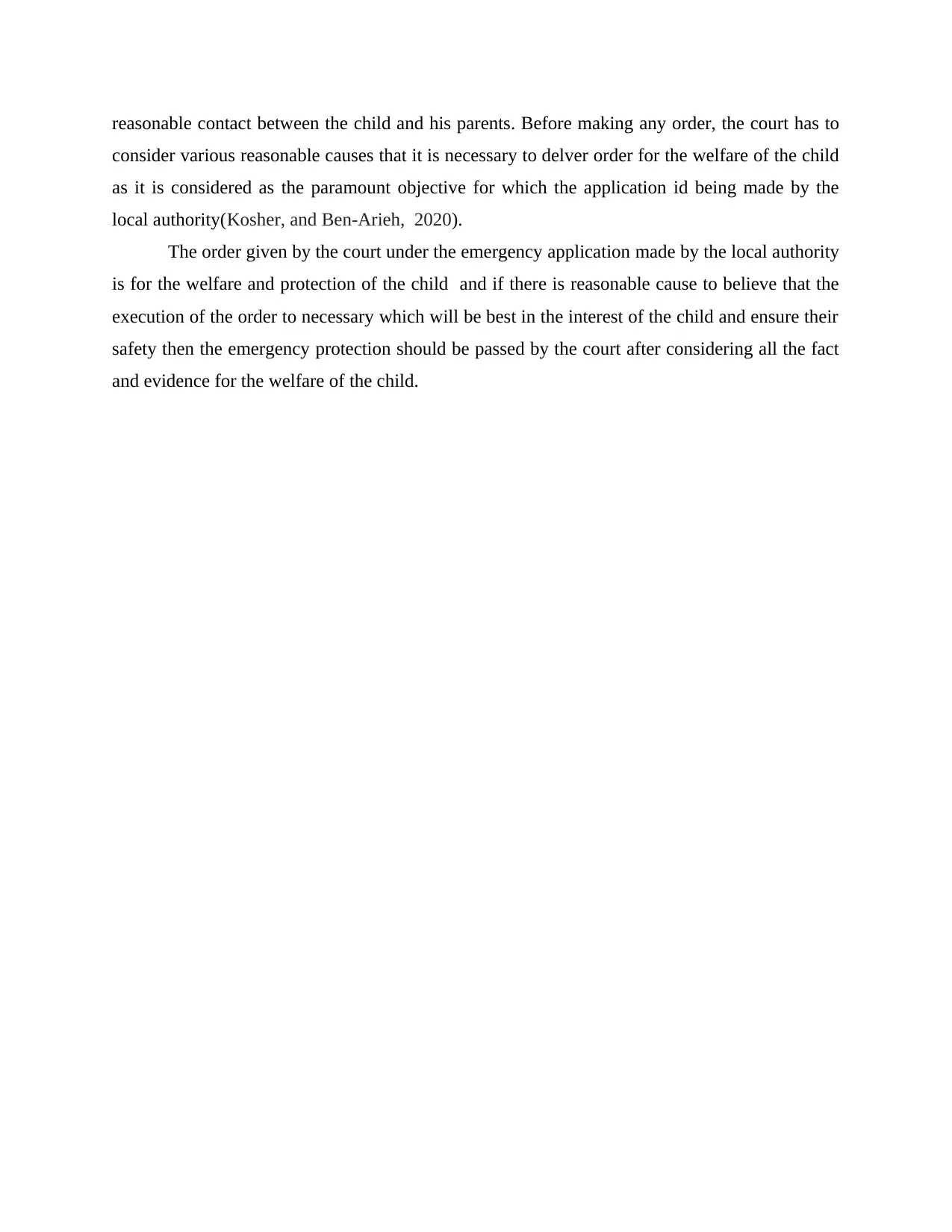
reasonable contact between the child and his parents. Before making any order, the court has to
consider various reasonable causes that it is necessary to delver order for the welfare of the child
as it is considered as the paramount objective for which the application id being made by the
local authority(Kosher, and Ben-Arieh, 2020).
The order given by the court under the emergency application made by the local authority
is for the welfare and protection of the child and if there is reasonable cause to believe that the
execution of the order to necessary which will be best in the interest of the child and ensure their
safety then the emergency protection should be passed by the court after considering all the fact
and evidence for the welfare of the child.
consider various reasonable causes that it is necessary to delver order for the welfare of the child
as it is considered as the paramount objective for which the application id being made by the
local authority(Kosher, and Ben-Arieh, 2020).
The order given by the court under the emergency application made by the local authority
is for the welfare and protection of the child and if there is reasonable cause to believe that the
execution of the order to necessary which will be best in the interest of the child and ensure their
safety then the emergency protection should be passed by the court after considering all the fact
and evidence for the welfare of the child.
Paraphrase This Document
Need a fresh take? Get an instant paraphrase of this document with our AI Paraphraser
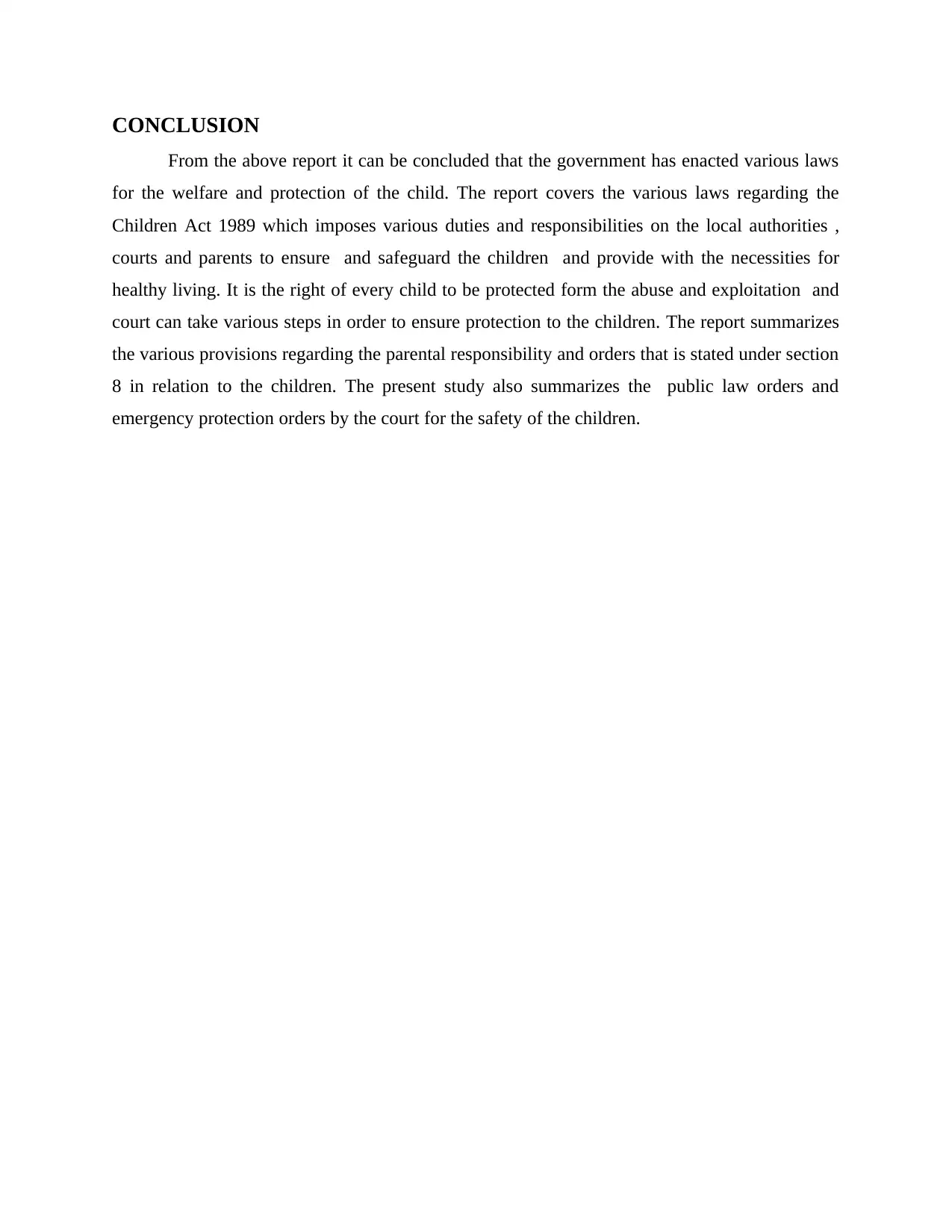
CONCLUSION
From the above report it can be concluded that the government has enacted various laws
for the welfare and protection of the child. The report covers the various laws regarding the
Children Act 1989 which imposes various duties and responsibilities on the local authorities ,
courts and parents to ensure and safeguard the children and provide with the necessities for
healthy living. It is the right of every child to be protected form the abuse and exploitation and
court can take various steps in order to ensure protection to the children. The report summarizes
the various provisions regarding the parental responsibility and orders that is stated under section
8 in relation to the children. The present study also summarizes the public law orders and
emergency protection orders by the court for the safety of the children.
From the above report it can be concluded that the government has enacted various laws
for the welfare and protection of the child. The report covers the various laws regarding the
Children Act 1989 which imposes various duties and responsibilities on the local authorities ,
courts and parents to ensure and safeguard the children and provide with the necessities for
healthy living. It is the right of every child to be protected form the abuse and exploitation and
court can take various steps in order to ensure protection to the children. The report summarizes
the various provisions regarding the parental responsibility and orders that is stated under section
8 in relation to the children. The present study also summarizes the public law orders and
emergency protection orders by the court for the safety of the children.
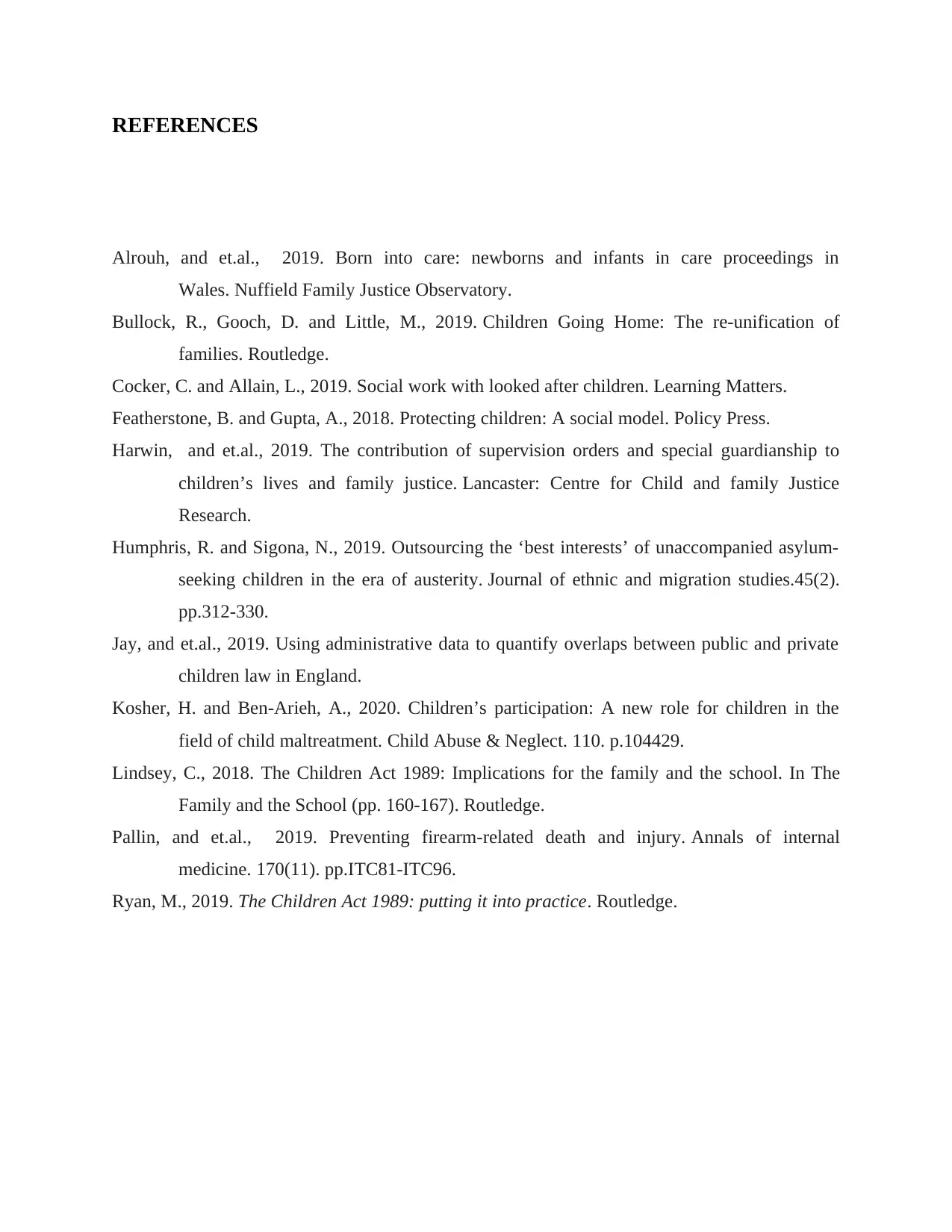
REFERENCES
Alrouh, and et.al., 2019. Born into care: newborns and infants in care proceedings in
Wales. Nuffield Family Justice Observatory.
Bullock, R., Gooch, D. and Little, M., 2019. Children Going Home: The re-unification of
families. Routledge.
Cocker, C. and Allain, L., 2019. Social work with looked after children. Learning Matters.
Featherstone, B. and Gupta, A., 2018. Protecting children: A social model. Policy Press.
Harwin, and et.al., 2019. The contribution of supervision orders and special guardianship to
children’s lives and family justice. Lancaster: Centre for Child and family Justice
Research.
Humphris, R. and Sigona, N., 2019. Outsourcing the ‘best interests’ of unaccompanied asylum-
seeking children in the era of austerity. Journal of ethnic and migration studies.45(2).
pp.312-330.
Jay, and et.al., 2019. Using administrative data to quantify overlaps between public and private
children law in England.
Kosher, H. and Ben-Arieh, A., 2020. Children’s participation: A new role for children in the
field of child maltreatment. Child Abuse & Neglect. 110. p.104429.
Lindsey, C., 2018. The Children Act 1989: Implications for the family and the school. In The
Family and the School (pp. 160-167). Routledge.
Pallin, and et.al., 2019. Preventing firearm-related death and injury. Annals of internal
medicine. 170(11). pp.ITC81-ITC96.
Ryan, M., 2019. The Children Act 1989: putting it into practice. Routledge.
Alrouh, and et.al., 2019. Born into care: newborns and infants in care proceedings in
Wales. Nuffield Family Justice Observatory.
Bullock, R., Gooch, D. and Little, M., 2019. Children Going Home: The re-unification of
families. Routledge.
Cocker, C. and Allain, L., 2019. Social work with looked after children. Learning Matters.
Featherstone, B. and Gupta, A., 2018. Protecting children: A social model. Policy Press.
Harwin, and et.al., 2019. The contribution of supervision orders and special guardianship to
children’s lives and family justice. Lancaster: Centre for Child and family Justice
Research.
Humphris, R. and Sigona, N., 2019. Outsourcing the ‘best interests’ of unaccompanied asylum-
seeking children in the era of austerity. Journal of ethnic and migration studies.45(2).
pp.312-330.
Jay, and et.al., 2019. Using administrative data to quantify overlaps between public and private
children law in England.
Kosher, H. and Ben-Arieh, A., 2020. Children’s participation: A new role for children in the
field of child maltreatment. Child Abuse & Neglect. 110. p.104429.
Lindsey, C., 2018. The Children Act 1989: Implications for the family and the school. In The
Family and the School (pp. 160-167). Routledge.
Pallin, and et.al., 2019. Preventing firearm-related death and injury. Annals of internal
medicine. 170(11). pp.ITC81-ITC96.
Ryan, M., 2019. The Children Act 1989: putting it into practice. Routledge.
⊘ This is a preview!⊘
Do you want full access?
Subscribe today to unlock all pages.

Trusted by 1+ million students worldwide

1 out of 10
Related Documents
Your All-in-One AI-Powered Toolkit for Academic Success.
+13062052269
info@desklib.com
Available 24*7 on WhatsApp / Email
![[object Object]](/_next/static/media/star-bottom.7253800d.svg)
Unlock your academic potential
Copyright © 2020–2026 A2Z Services. All Rights Reserved. Developed and managed by ZUCOL.





